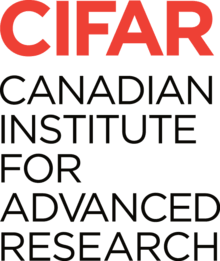Canadian Institute for Advanced Research
 | |
| Established | 1982 |
|---|---|
| President | Alan Bernstein |
| Chairman | Barbara Stymiest |
| Staff | 37 (2014) |
| Members | 340 researchers and advisors |
| Location | Toronto, Canada |
| Address | 180 Dundas Street West, Suite 1400 |
| Website |
www |
The Canadian Institute for Advanced Research (CIFAR) is an institute of advanced study that creates and maintains global research networks working on complex areas of inquiry.[1] It is supported by individuals, foundations and corporations, as well as funding from the Government of Canada and the Provinces of Ontario, British Columbia and Alberta. It was founded in 1982.
Operations
CIFAR staff supports the research of nearly 350 researchers, of which about half are located within Canada while the rest are located abroad. The President and CEO is directly responsible to the Chairman and the Board of Directors, who are responsible for funding allocation and approval of research programs. In May 2012, Alan Bernstein became president and CEO.
Research topics
As of 2014, CIFAR supports research in 11 major multidisciplinary areas:
- Cosmology & Gravity (established 1986)
- Earth System Evolution (established 1992)
- Integrated Microbial Biodiversity (established 2007)
- Child & Brain Development (Formerly known as Experience-based Brain and Biological Development, established 2003)
- Genetic Networks (established 2005)
- Institutions, Organizations & Growth (established 2004)
- Neural Computation & Adaptive Perception (established 2004)
- Quantum Materials (established 1987)
- Quantum Information Science (established 2002)
- Social Interactions, Identity & Well-Being (established 2005)
- Successful Societies (established 2002)
Archived programs:
- Artificial Intelligence and Robotics
- Evolutionary Biology
- Population Health
- Human Development
- Laws and the Determinants of Social Order
- Economic Growth and Policy
- Science of Soft Surfaces and Interfaces
- Nanoelectronics (established 1999)
Process
CIFAR works with senior academics around the world to identify major new areas of scholarly research where Canada has potential to lead. The institute assembles diverse groups of scholars in its programs, many of whom are established leaders in their fields, and others of who are rising academic stars. The institute invests in the researchers themselves, not in buildings, equipment, or laboratory supplies.
CIFAR supports advanced research by providing program members with such time-freeing benefits as teaching release, funding to hire graduate students and post-doctoral fellows, and general research funding.
The CIFAR research model employs "deep collaboration" at regular program meetings. These meetings exist to bring together researchers from different countries, institutions, disciplines and levels of experience, who might never otherwise meet.
History
CIFAR was founded by James Fraser Mustard.[2] The first 25 years of its history is covered in the book A Generation of Excellence by Craig Brown.[3]
CIFAR fellows published several papers in 1994 that argued policies driven by population health could address health disparities. They named 10 determinants of health, listing socio-economic status as the most influential. The government adopted the term population health and renamed a branch of the Public Health Agency of Canada "Population and Public Health."[4]
In April 2012, the United Nations Sustainable Development Solutions Network published the first World Happiness Report co-authored by CIFAR Senior Fellow John F. Helliwell at the University of British Columbia Lord Richard Layard, Director of the Well-Being Programme at LSE’s Centre for Economic Performance; and Professor Jeffrey Sachs, Director of The Earth Institute at Columbia University, Director of the SDSN, and Special Advisor to the UN Secretary General.[5]
Since the Institute's inception, 14 Nobel laureates have been associated with CIFAR.[6]
- Willard Boyle[7]
- George A. Akerlof[8]
- Sidney Altman[9]
- Philip W. Anderson[10]
- Kenneth Arrow[11]
- Walter Gilbert[12]
- Leland H. Hartwell[13]
- Daniel Kahneman[14]
- Robert B. Laughlin[15]
- Anthony J. Leggett[16]
- Roger B. Myerson[17]
- John C. Polanyi[18]
- Richard J. Roberts[19]
- Michael Smith[20]
See also
- Canadian government scientific research organizations
- Canadian university scientific research organizations
- Canadian industrial research and development organizations
Notes
- ↑ Who We Are. http://www.cifar.ca/who-we-are. Retrieved 2014-15-5
- ↑ J. Fraser Mustard, C.C., O.Ont., M.D., LL.D., F.R.S.C. Ottawa: Governor General of Canada. 2011. Retrieved 2014-05-14. http://www.gg.ca/honour.aspx?id=3234&t=12&ln=Mustard
- ↑ Brown, Craig. A Generation of Excellence. The Canadian Institute for Advanced Research, 2007. Published by the University of Toronto Press. ISBN 978-0-8020-9232-8
- ↑ Kirk, M, Tomm-Bonde, L, Schreiber, R. "Public health reform and health promotion in Canada." Global Health Promotion, vol. 21, no. 2 15-22 (June, 2014).
- ↑ First World Happiness Report Launched at the United Nations. 2012. Retrieved 2015-01-15. http://www.earth.columbia.edu/articles/view/2960
- ↑ CIFAR By the Numbers. Canadian Institute for Advanced Research. http://www.cifar.ca/cifar-by-the-numbers. Retrieved 2014-15-05
- ↑ "Willard S. Boyle - Biographical." Nobelprize.org. Stockholm: Nobel Foundation. http://www.nobelprize.org/nobel_prizes/physics/laureates/2009/press.html.
- ↑ George A. Akerlof. Nobelprize.org. Stockholm: Nobel Foundation. http://www.nobelprize.org/nobel_prizes/economic-sciences/laureates/2001/akerlof-facts.html. Retrieved 2014-15-05.
- ↑ Sidney Altman - Facts. Nobelprize.org. Stockholm: Nobel Foundation.. http://www.nobelprize.org/nobel_prizes/chemistry/laureates/1989/altman-facts.html. Retrieved 2014-15-05.
- ↑ Philip W. Anderson - Facts. Nobelprize.org. Stockholm: Nobel Foundation.. http://www.nobelprize.org/nobel_prizes/physics/laureates/1977/anderson-facts.html. Retrieved 2014-15-05.
- ↑ Kenneth J. Arrow - Facts. Nobelprize.org. Stockholm: Nobel Foundation.. http://www.nobelprize.org/nobel_prizes/economic-sciences/laureates/1972/arrow-facts.html. Retrieved 2014-15-05.
- ↑ Walter Gilbert - Facts. Nobelprize.org. Stockholm: Nobel Foundation.. http://www.nobelprize.org/nobel_prizes/chemistry/laureates/1980/gilbert-facts.html. Retrieved 2014-15-05.
- ↑ Leland H. Hartwell - Facts. Nobelprize.org. Stockholm: Nobel Foundation.. http://www.nobelprize.org/nobel_prizes/medicine/laureates/2001/hartwell-facts.html. Retrieved 2014-15-05.
- ↑ Daniel Kahneman - Facts. Nobelprize.org. Stockholm: Nobel Foundation. http://www.nobelprize.org/nobel_prizes/economic-sciences/laureates/2002/kahneman-facts.html. Retrieved 2014-15-05.
- ↑ Robert B. Laughlin - Facts. Nobelprize.org. Stockholm: Nobel Foundation. http://www.nobelprize.org/nobel_prizes/physics/laureates/1998/laughlin-facts.html. Retrieved 2014-15-05.
- ↑ Anthony J. Leggett - Facts. Nobelprize.org. Stockholm: Nobel Foundation. http://www.nobelprize.org/nobel_prizes/physics/laureates/2003/leggett-facts.html. Retrieved 2014-15-05.
- ↑ Roger B. Myerson - Facts. Nobelprize.org. Stockholm: Nobel Foundation. http://www.nobelprize.org/nobel_prizes/economic-sciences/laureates/2007/myerson-facts.html. Retrieved 2014-15-05.
- ↑ John C. Polanyi - Facts. Nobelprize.org. Stockholm: Nobel Foundation. http://www.nobelprize.org/nobel_prizes/chemistry/laureates/1986/polanyi-facts.html. Retrieved 2014-15-05.
- ↑ Richard J. Roberts - Facts. Nobelprize.org. Stockholm: Nobel Foundation. http://www.nobelprize.org/nobel_prizes/medicine/laureates/1993/roberts-facts.html. Retrieved 2014-15-05.
- ↑ Michael Smith - Facts. Nobelprize.org. Stockholm: Nobel Foundation. http://www.nobelprize.org/nobel_prizes/chemistry/laureates/1993/smith-facts.html. Retrieved 2014-15-05.